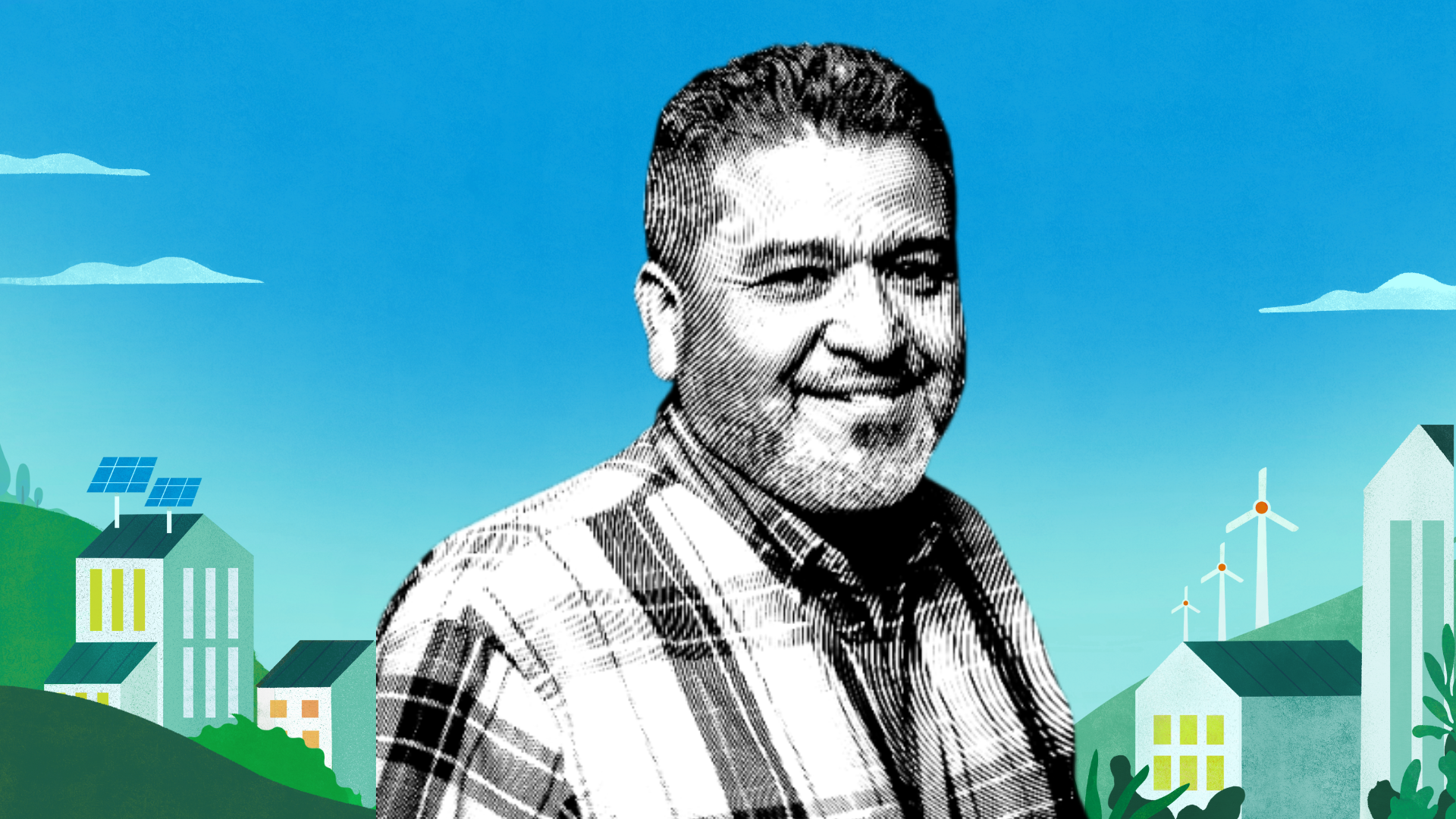Land a green job 101
Trying to break into a sustainability job? Tune in to our miniseries — six short episodes with pro tips to help you find a planet-saving career.
Learn how fast sustainability jobs are growing (fast), and where to find them. Hear about real-life strategies for resumes, green certifications and networking.
Episode 1: Five key questions to turbocharge your job hunt
Feeling overwhelmed? Sustainability jobs expert Trish Kenlon has advised hundreds of job hunters.
Join us for a real-time coaching session with green job seeker Maya Johnson. You’ll learn the key questions to help you find the right job for you, faster.
Sustainability jobs expert Trish Kenlon asked jobseeker Maya Johnson five key questions to help her narrow down her career choices. Try them! And visit our green jobs hub, where we’ve listed tons of planet-saving resources for job hunters, from job listings to expert advice to communities you can join.
- Which climate-change issue are you passionate about?
There are so many issues, it’s hard to know where to start. Whether it’s a field trip to a dump, growing up with toxic air pollution, or watching sea levels rise, consider the issues you feel deeply about. (Not sure? What are you curious about? What worries you? These are clues.) - What kind of day-to-day work do you prefer?
Which skills do you enjoy using? Do you like sitting at a desk, working alone or with others?
Do you love talking with people? Try advocacy and community organizing.
Do you like research and writing? Consider environmental policy and grant writing.
Love data? You could be well suited to field research or lab work.
Gravitate to social media? Investigate marketing and advertising roles in nonprofits, foundations, or sustainable companies. - What kind of organization do you want to work for?
Sustainability careers are now across industries and sectors. You could organize neighbors to grow a community garden; engineer fuel-efficient aircraft or write environmental policy—the list goes on.
Government work: You can work for local, state-level or federal departments. Starting at your mayor’s office or parks department is a great way into a public-sector career. For a sense of how innovative public sector work can be, listen to Yesh’s interview with Orlando Sustainability Director Chris Castro. He’s working to make his city the greenest in America.
Nonprofit: You can work for local land conservation organizations, statewide clean energy groups, nationwide or global nonprofits influencing sustainability practices on a larger scale. See our Green Jobs Hub for more ideas and links to sustainability job listings.
For-profit: Companies need specialists who can help them implement triple-bottom-line policies and practices. It will take new leadership to advocate for climate policy action, bring circularity to fashion and tech companies, and advance renewable energy use. - Where do you want to live?
For federal policy work, D.C. is probably your best bet. Many large nonprofits also influence federal and state policy; headquarters are in many major cities. Of course, working remotely is more and more common.
State and county-level environmental agencies are located in cities of every size in all 50 states.
You’d rather live quietly? Consider field work, research and conservation, which tend to take you out into nature and more rural areas. - Which resources do you already have?
Organizations where you have worked or volunteered:
What did you like about the work? Dislike?
Did you enjoy the people and work environment?Friends, classmates and former colleagues:
Where are they now? Can they connect you with people in organizations where you want to work? Follow them on LinkedIn.
When applying for jobs, these connections are key to getting out of the resume pile and landing an interview.Relevant news sources:
Start your day with news sources that cover climate change, such as E&E, Reuters, Politico and Bloomberg. (For more, see our Green Jobs Hub.)
By staying current, you’ll be more confident when networking and interviewing for jobs. You’ll also learn about new-to-you organizations you may want to work for.
Learn more:
Plan your job search strategy with job coach Trish Kenlon:
- Visit the Sustainable Career Pathways career coaching page.
- For more of Trish’s job search tips, listen back to How to Land a Sustainability J-O-B!
Network with jobseeker Maya Johnson:
- Learn more about Maya Johnson’s Reach One Book scholarship on Instagram.
For links to the many policy and advocacy organizations mentioned in this episode, see our Green Jobs Hub.
Episode 2: Green jobs are surging. Where to find them.
After years of sputtering along, sustainability job postings on LinkedIn spiked by 10%, about double the growth in other sectors of the economy. But where are these jobs? And which skills are in demand?
One of the foremost researchers studying the growth of corporate sustainability jobs, John Davies of GreenBiz, gives Yesh the inside scoop.
Sustainability jobs are growing fast. From industry hot spots to the most-needed skills, Episode 2 is full of insider tips for jobseekers from John Davies of GreenBiz, the go-to hub for the latest in business and sustainability.
Which industries are growing planet-saving jobs?
After years of sputtering along, sustainability job postings on LinkedIn grew about 10% in 2019.
- Some roles are part of small corporate sustainability teams. But sustainability skills are needed in more traditional positions as well.
- Download the GreenBiz State of the Profession report.
These jobs are growing across industries:
- Manufacturing
- Supply chain management
- Environmental, Social and Governance (ESG) Companies
- Finance
- Fashion
- Energy
- Technology
- Medical devices
- Transportation
Which skills are in greatest demand?
More and more industries are seeking people who understand circularity. For information about new jobs in the circular economy, read this GreenBiz column.
- Companies are greening their systems. Skills needed are specific to companies and industries.
- Industries moving quickly on circularity include medical devices, tech companies, and fashion.
- For in-depth information, read corporate sustainability reports. Look for their problem areas. Which skills do you have, or can you learn, that can solve these problems?
Learn how to build business cases for sustainability:
- Become a translator between different departments — for example, supply chain, purchasing and manufacturing.
- Building a business case takes communication, presentation, skill in interpreting and reporting sustainability metrics and collaboration.
- Be a constant learner. Stay current on new innovations and the latest research in your target industries and organizations.
Learn more
- Find new sustainability job posts daily. Visit our Green Jobs Hub.
- For dozens of job boards in energy, sustainability and the nonprofit sector, visit Sustainable Career Pathways.
- Search for sustainability jobs on LinkedIn.
- 18 million jobs will result from the Paris Agreement, reports The International Labor Organization. Read more about the growth of the green economy globally.
- Read the Weinreb Group’s report on the rise of the Chief Sustainability Officer.
Read about how Chipotle and other companies are incentivizing executives to improve ESG goals through financial bonuses.
Episode 3: Real talk about salaries, gender and race in green jobs
Working in sustainability doesn’t have to mean sacrificing decent compensation. Did you know corporate sustainability management salaries range from $50,000 to $280,000 a year?
GreenBiz careers expert John Davies shares his latest findings on high-paying jobs. And he gives Yesh the good and bad news about pay equity and diversity.
John Davies of GreenBiz shares his latest findings on compensation, pay equity and how you can increase your value — and your salary.
How does my role impact the salary I earn?
Managers in sustainability careers make anywhere from $50,000 to $280,000 a year. The longer you’ve been at your job, the more you make. But what are the other factors?
- Your responsibilities, particularly the number of people and projects you manage, have an outsized impact on salary.
- Already working in sustainability but wishing for a bigger paycheck? When people switch organizations, they often do so for a raise. (But don’t overlook your ability to use a job offer to negotiate for better pay where you already work.)
- When it comes to compensation, most master’s degrees don’t seem to make much of a difference. But in corporate sustainability jobs, having an MBA could. About a third of managers, directors and vice presidents have MBAs.
How diverse are green jobs? How does diversity relate to compensation?
- The number of women in sustainability leadership roles has increased close to 20 percentage points in every category since 2010.
- Corporate sustainability jobs have almost achieved gender pay equity. On average, women make a few thousand dollars less than their male counterparts.
- Increasingly, companies are hiring from outside, not simply promoting from within. This gives organizations access to more people. For organizations that are intentional about it, access to a wider pool of candidates can increase diversity.
- But the profession has a long way to go. When it comes to racial diversity, the numbers are stark: 77 percent of managers identify as white or Caucasian.
- To help solve this problem, GreenBiz is launching Greenbiz.org. It’s a nonprofit designed to bring more BIPOC candidates into the profession.
A listener asks: “Having a passion for sustainability used to be a unique quality that would get you over that edge for a job, but that’s not so true anymore. How do I show my unique value?” John’s advice:
- Don’t wait for a sustainability job title to take action. Work within your current role to bring sustainability to your workplace.
- Identify your organization’s sustainability “problem areas.” What are your ideas for solving them? Where can you improve circularity? Share your strategies with management and get to work where you are.
- Then, when you are ready to switch organizations, you’ll be able to show off your real-work outcomes.
Learn more:
Stay up-to-date with the latest news in sustainability and business with GreenBiz:
- Read the latest State of the Profession Report
- Watch webcasts on Women in Sustainability
- For more in increasing diversity in green jobs, visit GreenBiz.org
Visit our Green Jobs Hub for job-hunting resources and listings and more links to information about salary and diversity in green careers.
Episode 4: Certifications: Do I need them?
Sustainability certifications are a minefield. Do you have to spend time and money getting certified? How do you choose? GreenBiz’s John Davies knows which credentials are worth the effort and the cost — and when you don’t need them at all.
Sustainability certifications are a minefield. Do you have to spend time and money getting certified? How do you choose? GreenBiz’s John Davies knows which credentials are worth the effort and the cost—and when you don’t need them at all. In this episode, John gives us the scoop on:
- Gold-standard certifications specific to different industries
- Hands-on experience through internships, volunteering and other jobs is just as valuable as a certification
- You don’t need an Ivy League degree to get a green job
Which green certifications do I need to get hired?
- Entry-level jobs don’t often require certifications. If you need one to do your job, the organization should offer the opportunity to get it as part of your job training.
- Each industry comes with its own certifications, as do many different roles within industries. You don’t need the entire alphabet soup of certifications.
- Some gold-standards are the Global Reporting Initiative (GRI), GARP in finance (Global Association of Risk Professionals), LEED AP in design and APICS in supply chain management (Association of Supply Chain management).
- On their own, certifications don’t guarantee a job, a promotion or a salary increase.
Additional valuable experiences that can give you a leg up
- Leading the Sustainability Transformation from WholeWorks and GreenBiz is a 10-week simulation of a triple-bottom-line company. (Companies that attend to the triple bottom line attempt to ensure that their activities benefit people, profit and the planet.)
- EDF’s Climate Corps is a fellowship that offers opportunities to implement practical sustainability solutions in real companies.
A listener asks: “Do I need an Ivy League degree to get a leadership role in sustainability?”
- Not by a long shot! An elite degree is not a prerequisite for a career in sustainability.
- Many sustainability professionals want to mentor the next generation of purpose-driven workers, no matter their educational background.
- Your degree doesn’t matter as much as you might think. A critical thinking degree in the humanities is just as relevant to sustainability as is engineering or biochemistry.
Learn more:
Figure out which certifications are right for you:
For links to the policy and advocacy organizations mentioned in this episode, see our Green Jobs Hub.
Episode 5: Resumes suck. But here’s how to rock the search
Are you submitting lots of resumes and not hearing back? Guest Sam Charner of Net Impact has great advice. He addresses the biggest pain points of green job hunting, from being clueless about your specific path to what’s wrong when you can’t get an interview. His guidance will help you charge ahead.
Episode 6: Awkward! Networking mistakes to avoid
Everyone says networking is so important, but how? Who should you talk to? What do you say? Net Impact’s Sam Charner works with more than 400 chapters in 40 countries, with young people making a positive impact on the planet. He’s seen it all — and he shares the best and the worst of networking.
More episodes
-

How a psychology major is on the frontlines of decarbonizing a global industry
Yesh talks with Christie Gamble, Senior Sustainability Director at CarbonCure, a company that’s on a mission to decarbonize the concrete industry.
-

The fastest electric vehicle fleet makeover in the west
Yesh talks with the ebullient Gilbert Blue Feather Rosas, who raised millions of dollars to bring electric buses to one of America’s biggest school districts.
-

10 ways to save the planet
Yesh goes deep into the job opportunities of the future with Ryan Panchadsaram, co-author of the book Speed & Scale, an action plan to get global emissions to zero by 2050.

















